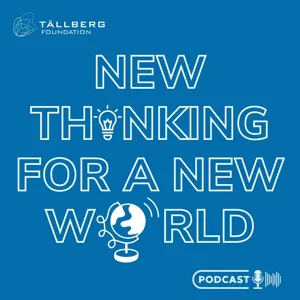Podcast Summary
Understanding Complex Behaviors in Business and Nature: Simplifying business processes and recognizing complex behaviors in nature can lead to success.
Simplicity and coordination are key to achieving success in business and nature. Mercury's financial services provide simplicity and control for businesses, allowing them to focus on their goals. Meanwhile, orcas, a large oceanic mammal, have been exhibiting coordinated behaviors towards boats, leaving some to speculate about their motivations. However, according to whale biologist Hal Whitehead, these behaviors might not be acts of revenge but rather a form of play and cultural learning among the orcas. This highlights the importance of understanding complex behaviors and motivations, whether in business or nature. For businesses, Mercury offers a simplified financial solution, while in the natural world, orcas' actions serve as a reminder of the intricacies and interconnectedness of animal behavior.
Whales exhibit distinct cultural behaviors: Whales have learned behaviors passed down through generations, challenging the notion that their actions are solely determined by genetics or environment
Whales, specifically sperm whales, exhibit distinct cultural behaviors that are not determined by genetics or environment. Researchers Hal and his team discovered this through studying different click dialects and behaviors among sperm whales in the same geographical region. These findings were met with skepticism from the scientific community, but the team's conclusion that whales have culture, meaning learned behaviors passed down through generations, has since been widely accepted. This discovery has important implications for understanding how whales adapt to changing environments and how human activities impact their populations. As the ocean continues to change due to climate change, the role of culture in whale survival becomes even more significant.
Challenging the human exclusivity of culture: Hal's theory proposed that animals, like whales, display cultural behaviors through learning and social transmission, challenging the belief that culture is exclusive to humans.
Hal's groundbreaking theory challenged the conventional belief that culture is exclusive to humans and instead proposed that animals, such as whales, display cultural behaviors through learning and social transmission within their communities. Hal's theory, which was controversial at the time, suggested that culture should be defined inclusively for other animals. Orcas, in particular, provide strong evidence for this theory. They are highly social creatures, and learning occurs within their family groups, which consist of matriarchal families, pods, clans, and communities. This social structure allows for the transmission of behaviors and knowledge from one generation to the next. Additionally, orcas have been observed exhibiting unique behaviors and distinct populations, further supporting the notion of cultural differences among different groups. Hal's theory, while not yet fully accepted at the time, paved the way for further research into animal culture and its importance in understanding the complex behaviors and social structures of various species.
Orcas learn and pass down knowledge through observation, imitation, and deliberate teaching: Orcas learn from their mothers and communities through observation, imitation, and deliberate teaching, contributing to their unique hunting techniques, communication methods, and cultural practices.
Orcas, or killer whales, learn and pass down knowledge through a combination of observation, imitation, and deliberate teaching within their communities. This is evident in their hunting techniques, communication methods, and cultural practices. For instance, mother orcas have been observed helping their offspring learn to hunt by practicing in safe environments where there are no actual prey. Orcas also have distinct communication methods and cultural behaviors that vary between different groups. For example, some orca groups have specific greeting rituals or food preferences that are unique to them. These cultural practices can persist over generations and contribute to the diversity and complexity of orca communities.
The significance of culture and diet in killer whales: Killer whales' specialized diet and cultural adaptations make it challenging for them to change, which can impact their survival if their primary food source becomes scarce.
The culture and diet of killer whales play a significant role in their biology and can potentially lead to the development of distinct species over millions of years. These orcas are highly specialized in their food sources and have gradual adaptations, making it challenging for them to change their diet or behavior even in response to environmental changes. For instance, the southern resident orcas in the Salish Sea, which primarily eat Chinook salmon, are struggling due to decreased availability of their preferred food source. Understanding the importance of their culture to them is crucial, as simply expecting them to switch to a new food source may not be a viable solution. The flexibility around their culture is a significant factor in determining their ability to adapt to the changing world. This cultural stubbornness can be a concern, as it may hinder their survival if their primary food source becomes unavailable.
Orcas' unique culture and identity: Orcas may have distinct dialects, mate within their groups, and exhibit unusual behaviors like boat rammings, emphasizing the importance of considering their complex cultures in conservation efforts
Orcas, like humans, may have a sense of culture and identity that shapes their behaviors and interactions within their groups. This was discussed in the podcast episode, where it was suggested that orcas might use different dialects, mate only within their groups, and even ram into boats as a part of their unique culture. It's important to respect and consider the significance of animal cultures in conservation efforts, focusing not just on numbers, but on the individual identities of the animals. The podcast episode, "The Doctopus's Secret," produced by Vox, explores this idea further, emphasizing the importance of understanding and respecting the complexities of animal behavior. Additionally, the new docuseries "Running Sucks" highlights the motivations behind women runners and their personal journeys towards achieving their goals. Overall, these discussions remind us to appreciate the unique complexities and identities of different species and individuals.






